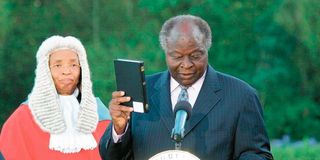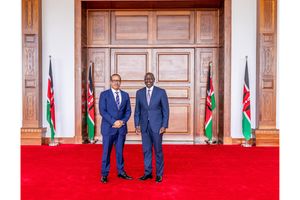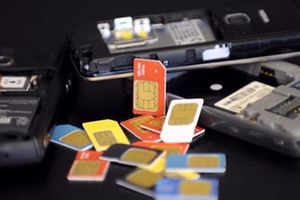The night in 2007 when Kibaki almost threw in towel

President Mwai Kibaki takes oath of office at State House in Nairobi on December 30, 2007 after being declared the winner of the disputed presidential election.
It was at night. And the two lonely souls at State House, Nairobi, could only watch as the results of the 2007 elections trickled in. President Mwai Kibaki was with Francis Muthaura, the Head of Public Service and Secretary to the Cabinet, and each was lost in their own thoughts. Everyone else had left, and outside, the State House grounds were deadly silent.
An election that pitted Mwai Kibaki against Raila Odinga, the leader of the Orange Democratic Movement, was about to end his political career. President Kibaki spoke little – and the much Muthaura could offer was comfort.
On Tuesday morning, on November 6, 2012, and for three hours, I sat with Mr Muthaura at his dining room in Rongai as I listened to this story that was to form part of Mwai Kibaki’s photo-biography, for which I was tasked to interview his close friends and write the manuscript. He spoke candidly about that night – when he watched Raila take the lead.
“(As) the gap continued to widen, I told the President that our field officers have told us not to worry since the PNU strongholds had not announced their results yet,” recalled Muthaura.
Kibaki’s Party of National Unity, was facing a herculean task and both him and Muthaura could see. “At one point, Odinga opened a gap with a million votes.” All through, President Kibaki did not panic – and unknown to many, he was prepared to go home if he was declared the loser.
Muthaura looked at the silent Kibaki.
“I told him that his record of performance as President in infrastructure development is all there to be seen… He just told me: ‘There is everything to show,” recalled Muthaura.
Resigned to electoral fate
As Muthaura explained the events of that night, I was only wondering how lonely it was at the top. At one point, as more results came in, it looked unlikely that President Kibaki would beat Odinga in the race. Mr Muthaura looked at Kibaki again and there was little he could do – and it appeared that the president had resigned to the electoral fate.
“I started counselling him,” Muthaura said. “I hoped I could offer him some help.” But certainly, there was little that they could do that night.
“Was he pained by the results?” I asked Muthaura, trying to trigger back his memory.
“He did not speak much. I told him that this was like a repeat of 2005 (the year Kibaki lost the referendum on a new constitution) and that people had just ganged up against Mt Kenya region.”
It was the best, perhaps, that Muthaura could offer that night. It was mostly a monologue. Apart from the TV election jingles and the intermittent announcements, Mr Muthaura did not know the pain Kibaki was going through. “He just told me: “There is everything to show.” And then he went quiet.

President Mwai Kibaki (left) receives the report on the 2007-2008 post-election violence from Justice Phillip Waki at Harambee House in Nairobi. With him is Prime Minister Raila Odinga (right)
Never stole any election
At this point, I didn’t wish to interject. Muthaura was now speaking in a low tone and a firm voice: “Kibaki never stole any election and neither did he tell anyone to steal. I was with him that night,” said Muthaura, who would later be falsely accused of planning post-election violence that followed Kibaki’s victory.
It was after votes from PNU strongholds started trickling in that the ODM claimed that there was rigging.
“I told Kibaki that we need to talk to the media for the stability of the country. It was a very tense moment,” and he said, “Go and talk to them.”
“Kibaki told me that the media was key to holding the country together and we had a meeting with media owners and senior editors. We returned to State House and there was an overnight recount at KICC, which all parties had agreed to abide by. These were the results that enabled Electoral Commission chairman Samuel Kivuitu to announce the results,” recalled Muthaura.
With Kivuitu’s announcement that Kibaki had won, the task of swearing him in fell on Mr Muthaura.
“I remember I was with Raphael Tuju, Chief Justice Evans Gicheru and Attorney-General Amos Wako when we made the decision to swear-in Kibaki that day. Initially, we had thought of having an elaborate ceremony, but due to the crisis that was unfolding, we thought that a power vacuum would encourage power struggle. And since the electoral commission had announced the results, we invited diplomats to State House to come and witness the swearing-in. It was not at night. But that was the best way to save the country.”
Operating without a Cabinet
For one week, as the country went through post-election violence, Kibaki was operating without a Cabinet.
“There was a lot of pressure on him with VIPs and Heads of State calling to help resolve the crisis. In private and public, the president had said he wanted an all-embracing Cabinet in order to restore peace. We advised him to pick a skeletal Cabinet to help him absorb the pressure. He needed a Minister for Foreign Affairs, a Finance minister and a Special Programmes minister. Kibaki agreed to this proposal.”
Initially, it had been thought that Kibaki was giving the prime jobs to PNU even as the talks were going on. “We were not giving PNU prime jobs. Those were jobs to help us deal with the crisis,” Muthaura said.
All this time, Kibaki did not show signs of panic: “He knew that at the end of the day, the buck stops with him. He never failed when he was required to make a decision. The good thing with Kibaki is that if you gave him advice, he owned it and would never apportion blame if it failed. One thing he knew was that the security of the country was intact. It’s sad we lost people, but at no time was the Kenyan nation under threat. The international community blew the crisis out of proportion.”
During Kibaki’s presidency, Muthaura was “Mr Everything” and is credited for putting order into government. He would recall how Kibaki accepted the 2005 referendum defeat with so much ease that he (Muthaura) was surprised.
When the country was voting for a new constitution in 2005 – when he led the Yes team against Orange (for No) – Kibaki didn’t return to Nairobi after voting in Nyeri. After the electoral commission announced that the No team had won, it was Muthaura who picked the call that morning and asked the president to return to State House and accept the results.
“Initially, he had planned to return in the afternoon. I was very demoralised and I remember him telling me: ‘You should not be too low… That matter is concluded.’ I was surprised that Kibaki appeared to be in high spirits, and that helped us a lot. He came to Nairobi that morning and addressed the nation. I was happy about that.”




